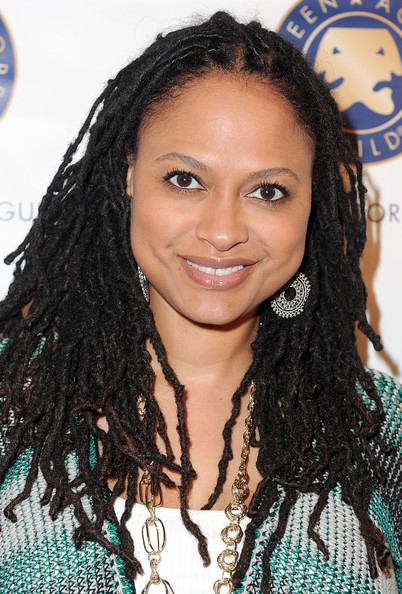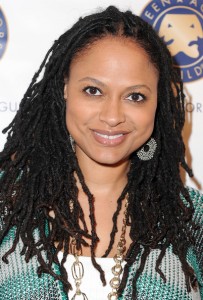
Ava Marie DuVernay (born August 24, 1972) is an American director, screenwriter, producer, film marketer, and film distributor. At the 2012 Sundance Film Festival, DuVernay won the Best Director Prize for her second feature film Middle of Nowhere, becoming the first African-American woman to win the award. For her work in Selma, DuVernay is the first black female director to be nominated for a Golden Globe Award. With Selma, she is also the first black female director to have a film nominated for the Academy Award for Best Picture.
DuVernay was born in Long Beach, California, to mother Darlene Maye, an educator. DuVernay is the oldest of the five children. DuVernay grew up in Lynwood, California and Compton, California. DuVernay’s father, Murray Maye, a businessman, is from Hayneville, Alabama, a small town between Montgomery and Selma. DuVernay spent summers in Hayneville. DuVernay said that these summers in Alabama influenced the making of Selma, as her father saw the walk through his county as a small child.
DuVernay attended Saint Joseph High School, where she graduated in 1990. She graduated with a B.A. from the University of California, Los Angeles, in 1995, where she double-majored in English and African American studies. While in college DuVernay became interested in producing for broadcast journalism. She was an intern for CBS News and worked on the national evening news with Connie Chung and Dan Rather during the O.J. Simpson murder trial. She became disillusioned with journalism, and decided to switch to publicity.
After graduation, she worked for a small studio as a junior publicist. DuVernay worked at FOX, Savoy Pictures and other public relations firms for four years before forming her own agency, The DuVernay Agency, later known as DVA Media + Marketing, in 1999. The award-winning marketing and publicity firm has provided strategy and execution for more than 100 film and television projects by directors such as Steven Spielberg, Clint Eastwood, Michael Mann, Robert Rodriguez, Kevin Smith, Bill Condon, Raoul Peck and Gurinder Chadha.
In 2008, DuVernay made her feature directorial debut with the documentary This Is the Life, a history of LA’s Good Life Cafe’s arts movement. DuVernay said that while she was trying to raise money for a feature length film, “documentaries were something that I could do for a small amount of money, and then I felt like as long as I found the truth in the stories I was telling as a doc, I could teach myself filmmaking through doc filmmaking.”
In 2011, DuVernay’s first narrative feature film, I Will Follow, a drama starring Salli Richardson-Whitfield, was released theatrically. DuVernay’s aunt Denise Sexton was the inspiration for the film. DuVernay made the film in 15 days with her own money: DuVernay “kept costs under $50,000 by staying in one location.” Roger Ebert championed the film, stating: “I Will Follow is one of the best films I’ve seen about coming to terms with the death of a loved one.” I Will Follow was an official selection of AFI Fest, Pan-African Film Festival, Urbanworld and Chicago International Film Festival.
In the summer of 2011, DuVernay began production on her second feature film, Middle of Nowhere. The film was acquired by AFFRM and Participant Media at the 2012 Sundance Film Festival, where it played in U.S. Dramatic Competition and garnered the Best Director Award for DuVernay, the first African-American woman to ever win the prize. DuVernay also won the Independent Spirit John Cassavetes Award for her work on the film.
ESPN commissioned DuVernay to produce and direct Venus Vs., a documentary on Venus Williams’ fight for equal prize money for their film series Nine for IX, which aired July 2, 2013.
DuVernay directed and co-wrote Selma, a $20 million budget film produced by Plan B Entertainment, about Martin Luther King Jr., Lyndon Johnson, and the 1965 Selma to Montgomery march.The movie was released on December 25, 2014.
There was significant controversy about Selma and its depiction of Lyndon Johnson’s actions portrayed in the film. Former Johnson domestic policy aide Joseph A. Califano, Jr. criticized DuVernay for ignoring and falsifying history, and particularly for suggesting that Johnson reluctantly supported King’s efforts and that he set the FBI to investigate King.
In December 2014, at a Q&A moderated by Gay Talese, DuVernay defended her vision, saying “I think everyone sees history through their own lens, and I don’t begrudge anyone from wanting to see what they want to see. This is what I see. This is what we see. And that should be valid. I’m not gonna argue history; I could, but I won’t.” For the film she re-wrote most of the original screenwriter Paul Webb’s script with an increased emphasis on King and the people of Selma as central figures.”The script was the LBJ/King thing, but originally, it was much more slanted to Johnson. I wasn’t interested in making a white-savior movie; I was interested in making a movie centered on the people of Selma.” In response to the criticisms of historians and media sources that accused her of irresponsibly rewriting history to portray her own agenda, DuVernay pointed out that the film is “not a documentary. I’m not a historian. I’m a storyteller”.
DuVernay expressed frustration at the controversy: “And for this to be reduced — reduced is really what all of this is — to one talking point of a small contingent of people who don’t like one thing, is unfortunate, because this film is a celebration of people, a celebration of people who gathered to lift their voices — black, white, otherwise, all classes, nationalities, faiths — to do something amazing.”
The film was nominated for Best Picture and Best Song, but not Best Director, by the Academy Awards. While the lack of diversity of the Oscar nominations for 2014 was the subject of much press, especially on Twitter, the film of the only person of color that was nominated for the 87th Academy Awards, Mexican director Alejandro González Iñárritu, ended up taking top honors in four categories at the February 2015 87th Academy Awards – Best Picture, Best Director, Best Original Screenplay, and Best Cinematography. The Award for Best Original Song went to “Glory” from “Selma”. DuVernay stated that she had not expected to be nominated so the omission didn’t really bother her; rather she was hurt by actor David Oyelowo not being nominated. As to the question of racial diversity of awards, she stated that the obstacles to people of color being represented in the Academy Awards were systemic.
DuVernay has cited Haile Gerima, Julie Dash and Charles Burnett as her influences as a filmmaker and producer. DuVernay says she belongs to what she calls “‘a small sorority’ of black female filmmakers and producers, who are part of another modest American sisterhood: female directors and producers of any color.” “The idea is not to give women power. The idea is for women to take that power,” DuVernay says. “I try to work from a place without permission. I am not working in a permission-based way. I encourage us all to find our own way and not wait.”
On a career as a filmmaker: DuVernay said “I never had a desire to be a filmmaker. As a child and a teenager and in college, I was not aware of black women making films.” On how she became a filmmaker: “I was a film publicist, so I represented a lot of filmmakers and I was always around them. I [started thinking] ‘They’re just regular people, like me, with ideas. I’ve got ideas.’ That’s literally how it started. It was definitely a career change; I didn’t make my first little short until I was 32. It was kind of intimidating coming in to it so late—all these whippersnappers fresh out of film school, I couldn’t do any of that. But I did start to recognize that being so close to really great filmmakers and watching them direct on set and the experiences that I did have, although different from film school, were still super valuable. I learned just from being around. I coupled that with some very intentional study and practice—picking up a camera—and started just making it.”
On discussing being a black filmmaker: “Some black filmmakers will say, ‘I don’t want to be considered a black filmmaker, I’m a filmmaker.’ I don’t think that. I’m a black woman filmmaker. Just like A Separation is [by] an Iranian, male filmmaker and his film is through that lens, my films are through my lens, and I think it’s valuable and fine and worthy to be seen by everyone. So I don’t have any problem with this. I like talking about all the amazing black independent filmmakers that are on the scene—there are a good number that are doing great work. And I love talking about the issues that we deal with as women filmmakers, ’cause there’s so many—the drastic drop from a woman making her second film to her third film, it drops by, like, 50 percent. Women filmmakers, after the second [film], half of them disappear. That really startled me. That’s something that we have to be mindful of as women critics and journalists and actors and directors. So, yeah, I think it’s worth talking about.”
On Roger Ebert: When she was 8 or 9 her aunt brought her to rehearsals for the Oscars where she saw Ebert, who came over to her while she was screaming, “thumbs up, thumbs up.” She got a picture with Ebert that day. DuVernay said that “Ebert’s review [of I Will Follow] really got to the heart of what I was trying to articulate. It touched me so much I sent him a picture from the Oscars.” Ebert wrote a blog post in tribute to his aunt and DuVernay’s aunt.

